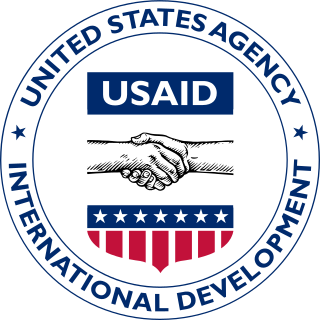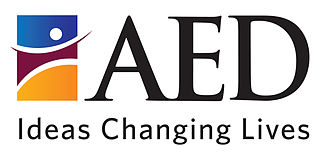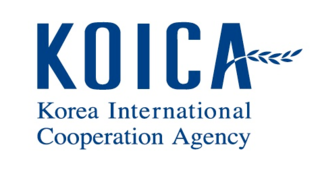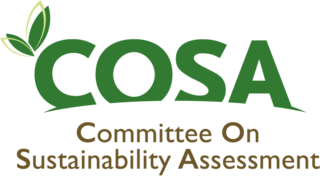
The United States Agency for International Development (USAID) is an independent agency of the United States government that is primarily responsible for administering civilian foreign aid and development assistance. With a budget of over $50 billion, USAID is one of the largest official aid agencies in the world and accounts for more than half of all U.S. foreign assistance—the highest in the world in absolute dollar terms.
Improving Economies for Stronger Communities (formerly known as International Executive Service Corps) is an international economic development not-for-profit organization with headquarters in Washington, D.C. IESC was founded in 1964 by David Rockefeller, States M. Mead III, Frank Pace, Sol Linowitz, and other American business leaders. IESC has worked in sub-Saharan Africa, Europe and Eurasia, Asia and the Near East, and Latin America and the Caribbean. Geekcorps is a division of IESC.

Development aid is a type of aid given by governments and other agencies to support the economic, environmental, social, and political development of developing countries. It is distinguished from humanitarian aid by aiming at a sustained improvement in the conditions in a developing country, rather than short-term relief. The overarching term is foreign aid. The amount of foreign aid is measured though official development assistance (ODA). This is a category used by the Development Assistance Committee (DAC) of the Organisation for Economic Co-operation and Development (OECD) to measure foreign aid.

Catholic Relief Services (CRS) is the international humanitarian agency of the Catholic community in the United States. Founded in 1943 by the Bishops of the United States, the agency provides assistance to 130 million people in more than 110 countries and territories in Africa, Asia, Latin America, the Middle East and Eastern Europe.
ACDI/VOCA is an international development nonprofit organization based in Washington, D.C., United States, that fosters broad-based economic growth, increased living standards, and community development. Incorporated in 1965, ACDI/VOCA's mission is to promote economic opportunities for cooperatives, enterprises and communities through the innovative application of sound business practice. ACDI/VOCA has worked in 148 countries since 1963. Total revenues for ACDI/VOCA and its affiliates are approximately $154 million. ACDI/VOCA employs approximately 1,270 people in the US and overseas.

EngenderHealth is a 501(c)(3) nonprofit organization based in Washington, D.C., with a focus in sexual and reproductive health (SRH). The organization operates in nearly 20 countries throughout Africa, Asia, and North and South America.

AED, formerly the Academy for Educational Development, was a 501(c)(3) nonprofit organization that focused on education, health and economic development for the "least advantaged in the United States and developing countries throughout the world." AED operated more than 250 programs in the United States and in 150 other countries.

The United States established diplomatic relations with Malawi in 1964 after Malawi gained independence from the United Kingdom. Malawi's transition from a one-party state to a multi-party democracy significantly strengthened the already cordial U.S. relationship with Malawi. Significant numbers of Malawians study in the United States. The United States has an active Peace Corps program, Centers for Disease Control and Prevention, Department of Health and Human Services, and an Agency for International Development (USAID) mission in Malawi. Both countries have a common history and English language, as they were part of the British Empire.

The diplomatic relationship between the United States of America and Zambia can be characterized as warm and cooperative. Relations are based on their shared experiences as British colonies, both before, after and during the struggle for independence. Several U.S. administrations cooperated closely with Zambia's first president, Kenneth Kaunda, in hopes of facilitating solutions to the conflicts in Rhodesia (Zimbabwe), Angola, and Namibia. The United States works closely with the Zambian Government to defeat the HIV/AIDS pandemic that is ravaging Zambia, to promote economic growth and development, and to effect political reform needed to promote responsive and responsible government. The United States is also supporting the government's efforts to root out corruption. Zambia is a beneficiary of the African Growth and Opportunity Act (AGOA). The U.S. Government provides a variety of technical assistance and other support that is managed by the Department of State, U.S. Agency for International Development, Millennium Challenge Account (MCA) Threshold Program, Centers for Disease Control and Prevention, Department of Treasury, Department of Defense, and Peace Corps. The majority of U.S. assistance is provided through the President's Emergency Plan for AIDS Relief (PEPFAR), in support of the fight against HIV/AIDS.

U.S.–Uzbekistan relations formally began when the United States recognized the independence of Uzbekistan on December 25, 1991, and opened an embassy in Tashkent in March 1992. U.S.-Uzbekistan relations developed slowly and reached a peak following the U.S. decision to invade Afghanistan following the September 11, 2001 attacks. Relations cooled significantly following the "color revolutions" in the former Soviet republics of Georgia, Ukraine, and Kyrgyzstan in 2003–2005, and the Government of Uzbekistan sought to limit the influence of U.S. and other foreign non-governmental organizations (NGOs) working on civil society, political reform, and human rights inside the country.

Chad–United States relations are the international relations between Chad and the United States.

The United States and North Macedonia enjoy excellent bilateral relations.
The Farmer-to-Farmer (F2F) Program is funded by the US Agency for International Development through the US Farm Bill to assist developing countries, middle-income countries, and emerging markets around the world to increase farm production and incomes. It promotes sustainable economic growth, food security and agricultural development worldwide. Volunteer technical assistance from US farmers, agribusinesses, cooperatives, and universities helps developing countries improve productivity, access new markets, build local capacity, combat climate change and conserve environmental and natural resources. Farmer-to-Farmer also aims to increase the American public's understanding of international development issues and programs and international understanding of the U.S. and U.S. development programs.

The Public-Private Alliance Foundation (PPAF), a non-profit organization based in New York, works with collaborators to support teaching and fieldwork opportunities on solar cooking and bio-digesters for biogas and garden fertilizer in Haiti. The Public Private Alliance Foundation (PPAF) promotes the United Nations Sustainable Development Goals and uses a business approach for poverty alleviation while focusing on renewable energy, public health, and entrepreneurship; this is achieved through projects and seminars involving multi-stakeholder cooperation with both USA and Haitian based organizations. As a special focus, PPAF builds evidence to increase the impact of innovations for clean cooking in Haiti. Most families in Haiti depend on charcoal for daily cooking, leading to respiratory disease and massive deforestation. PPAF and collaborating organizations conduct research & introduce development activities to improve the lives and livelihoods of all, especially for women and girls, through solar, biogas and ethanol fuel and cookstoves and related small business. The aim is to help families escape the poverty-respiratory disease-deforestation trap, by reducing the heavy dependence on charcoal for daily cooking.

The Korea International Cooperation Agency was established in 1991 by the Ministry of Foreign Affairs of South Korea as a governmental organization for Official Development Assistance (ODA). KOICA's goal is to enhance the effectiveness of South Korea's grant aid programs for developing countries by implementing the government's grant aid and technical cooperation programs. KOICA is led by three-year-term president of the board who is appointed by the President upon the recommendation of Foreign Minister.
International Voluntary Services,Inc. (IVS) was a private, non-profit corporation for benevolent, charitable, and educational purposes chartered under the laws of the District of Columbia in 1953 to place volunteers in international humanitarian and development projects. From its founding until its dissolution in 2002, IVS placed volunteers in 39 countries in Asia, Africa, and Latin America. Its largest and longest programs were in South Vietnam, Laos, Algeria, and Bangladesh. Although the organization's roots were grounded in part in Christian pacifism, it operated on a nonsectarian basis, accepting volunteers regardless of their religious beliefs or nationality., Over its lifetime, the IVS program evolved from the placement of only American citizen volunteers to placement of internationally-recruited volunteers and then in later years to recruitment of local volunteers from within the country being assisted. Elements of the IVS program model have been adopted by the U.S. Peace Corps and many present day non-governmental organizations (NGOs). Sections below discuss the IVS program model, activities over time, and legacy.

The Committee on Sustainability Assessment (COSA) is a global consortium of development institutions that work collaboratively to advance sustainability learning with systematic and science-based measurement. COSA applies a pragmatic and collective approach for using scientific methods to develop indicators, tools, and technologies to measure the distinct social, environmental, and economic impacts and are applied in performance monitoring, evaluation, return on investment (ROI) calculation, and impact assessment. COSA has a public mission to open its scientific methods and metrics up to widespread use.

United States aid to Sudan has three key objectives: a definitive end to conflict, gross human rights abuses, and genocide in Darfur; implementation of the north–south Comprehensive Peace Agreement that results in a peaceful post-2011 Sudan, or an orderly path toward two separate and viable states at peace with each other; and ensuring that Sudan does not provide a safe haven for international terrorists. Sudan has experienced two civil wars since 1955, the second of which lasted 22 years. During this time, the U.S. was the largest provider of foreign aid to Sudan, largely focused on humanitarian aid through the U.S. Agency for International Development. Sudan is listed as the U.S. government's highest priority in Africa due to "its importance for counter-terrorism and regional stability, as well as the magnitude of human rights and humanitarian abuses" U.S. foreign aid to Sudan has begun to see some positive indicators of performance although critical reaction has said that aid to Sudan is neither strategic nor focused.

Cuso International is a Canadian international development organization that connects communities around the world with skilled Canadians to help end poverty and inequality. Established in 1961, Cuso International has deployed more than 15,000 volunteers and has worked in more than 100 countries on long-term development projects.
Foreign aid for gender equality in Jordan includes programs funded by governments or non-governmental organizations (NGOs) that aim to empower women, close gender based gaps in opportunity and experience, and promote equal access to education, economic empowerment, and political representation in the Hashemite Kingdom of Jordan.














